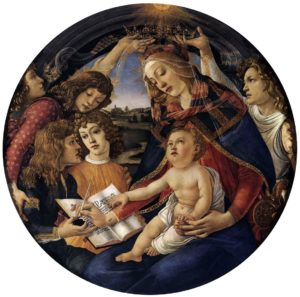Thoughts on Sunday’s Lessons for Dec. 23, 2018
First Reading: Micah 5:2-5a
God’s active, liberating preference for the poor and the oppressed is made manifest in Sunday’s readings. This theme may seem surprising at first, but it is in fact a deeply significant message for the impending birth of Jesus, who will hold up the poor, the hungry, the ill and imprisoned and oppressed as the central focus of his good news.

Madonna del Magnificat (Madonna of the Magnificat), tempera painting on panel (1483) by Sandro Botticelli (1445-1510). Uffizi Gallery, Florence. (Click image to enlarge.)
Psalm: Canticle 15 (Luke 1:46b-55)
The Magnificat, Mary’s song of praise, may either be sung as Sunday’s Psalm or read as the second portion of the Gospel of the day. In this beloved song as told by Luke, the pregnant Mary sings out grateful praise for God. She rejoices in all that God has done for her, celebrating a powerful yet merciful God who loves us and calls us to acts of mercy and justice. God has brought down the powerful from their thrones and lifted up the lowly, she sings. God has filled the hungry with good things and sent the rich away empty. God’s justice is restorative – taking from those who have much and giving to those who have none.
Alternate Psalm: Psalm 80:1-7
This Psalm was likely written during or recalls a time of exile and destruction – the place names in the second verse suggest that it relates to the loss of the Northern Kingdom, Israel, to the Assyrians. In verses of sorrow, it calls on Israel’s God to come and help, to restore the people, who, in a memorable metaphor, have been fed with the bread of tears and given tears to drink. Though they have suffered the derision, laughter and scorn of their enemies, including their own neighbors, God has power to save them through the light of God’s own countenance.
Second Reading: Hebrews 10:5-10
The Letter to the Hebrews, modern biblical scholars say, probably originates from the early 100s, after the destruction of the Temple in 70 A.D., when Christianity was separating from rabbinical Judaism. Perhaps intended to reach backsliding Christian Jews, it seems to suggest that God abolished the “empty” sacrifices of the Jewish Temple, replacing them with Jesus’ sacrifice on the cross. In modern times, especially after the Holocaust, we should try to avoid this view of Judaism as “abolished,” hearing instead the hopeful message that God’s promise to Israel at Sinai continues in us, the body of Christ, through Jesus’ incarnation, the Christmas miracle.
Gospel: Luke 1:39-45 (46-55)
This lovely reading from Luke includes the narrative that immediately precedes the Magnificat, the Song of Mary. Here we are told of Mary’s visit to her older cousin Elizabeth. Both women are pregnant – Elizabeth with John, Mary with Jesus – and both conceived in miraculous ways, visited by angels with the news that they would give birth. When the women meet, Elizabeth feels her child leap in her womb with what she perceives as joy. Elizabeth, suddenly filled with the Holy Spirit, declares Mary blessed among women. “Why has this happened to me,” Elizabeth wonders in amazement, “that the mother of my Lord comes to me?” Then, in the following verses, Mary responds with the Magnificat.
